As demand pullback spreads, the economy slows and markets sink even lower, many of us are afraid to even look... Is there anything we can do to save our portfolios? Yes — Participate in the annuities from water products! Water On Demand makes it possible, for the first time, to not only earn royalties, but gain access to amazing, portfolio-righting upside potential. Find out how in the replay.
Transcript from recording
Opening
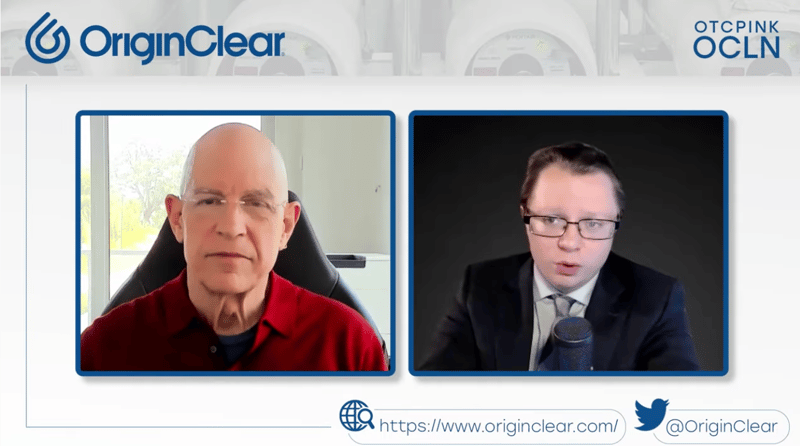
Michael: Is there any last pieces of information about yourself you would like to share with people today before we go?
Riggs: Well, of course I because of my background, I am an idealist, but I really feel that just giving won't solve problems. You have to find the actual solution, and usually it's technology. And with the technology comes the financial solution, which is why in the next interview we'll discuss the fintech we came up with, which I believe is a major solution to this problem of degrading infrastructure.
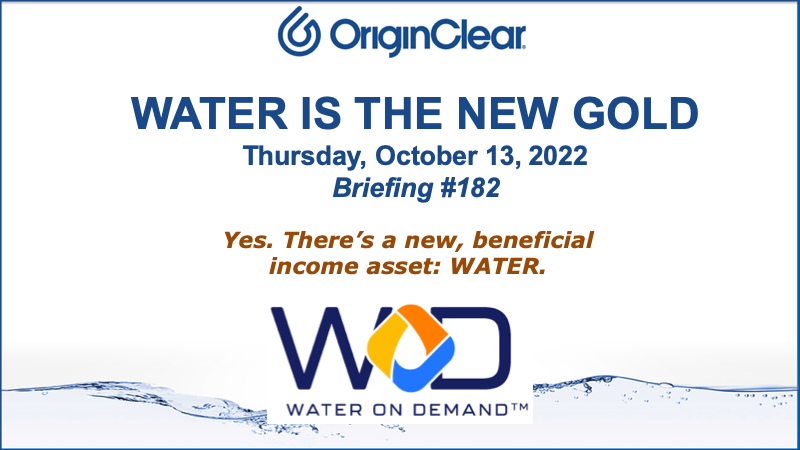
Introduction
And welcome everyone to the CEO briefing. That's a little tease on an interview series. We'll play some of it more. But a great outfit is helping us with shareholder awareness called North Equities. And despite being Canadians, I think they're pretty good people. Just kidding. I was born in Canada so I can say that. Right.
So Water is the New Gold and we are monetizing water because until recently it was primarily a government business and it's just like the New York subway system in reverse. The New York subway system started out commercial, which is why there's so many subway lines that converge on Wall Street because they were all in competition and then, of course, got nationalized by the city of New York. Now these things are happening in reverse and water is one of the major events. All right. Thursday, October 13th, briefing number 182. And yes, there is a new beneficial income asset, water. All right.
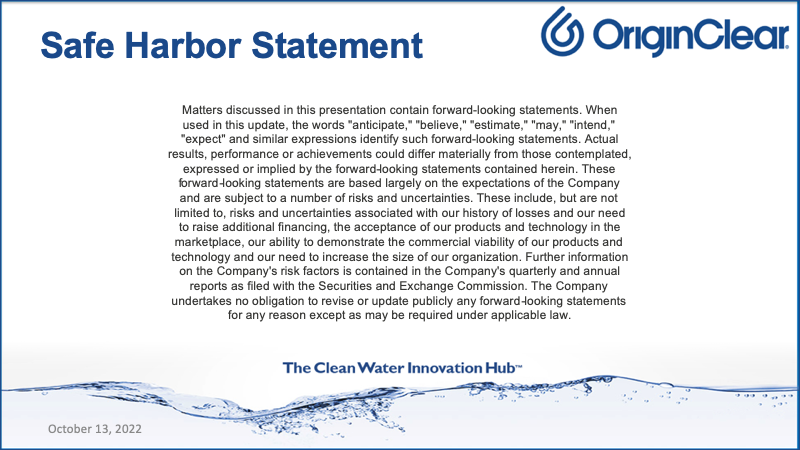
As usual, we have our Safe Harbor statement disclaimer on the offering, which you should always do your own due diligence on, of course.
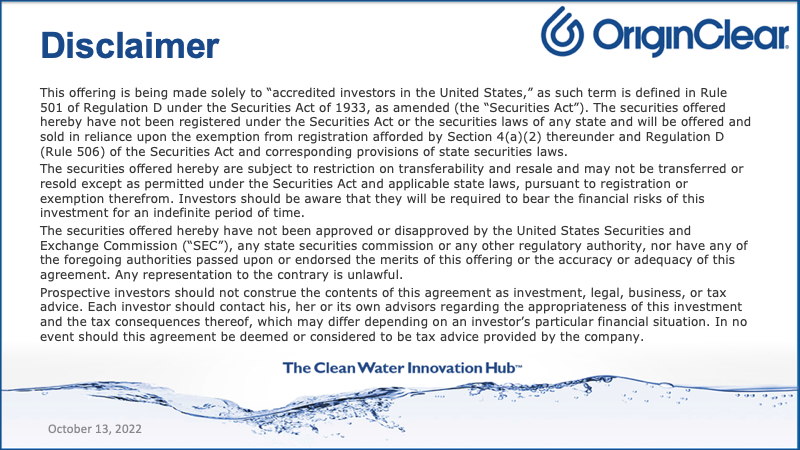
In The News
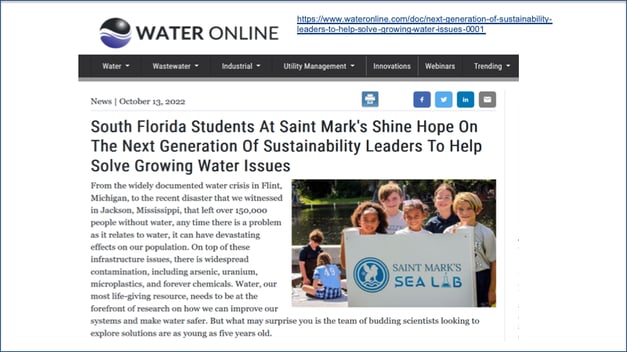
Coverage in the Water Trades
We got some coverage in the water trades. For a long time we were not focusing on the water trades. We were trying to get some headway with mainstream media. But the water trades are important because they show up in in web searches and they're also very good for business, obviously.
So we got a little piece in Water Online. It's about this cool thing where these kids, these South Florida students put together a project which, there they are, St Mark's Episcopal School, and they launched this thing called Sea Lab, which is a tidal pool that enables them to basically explore water.
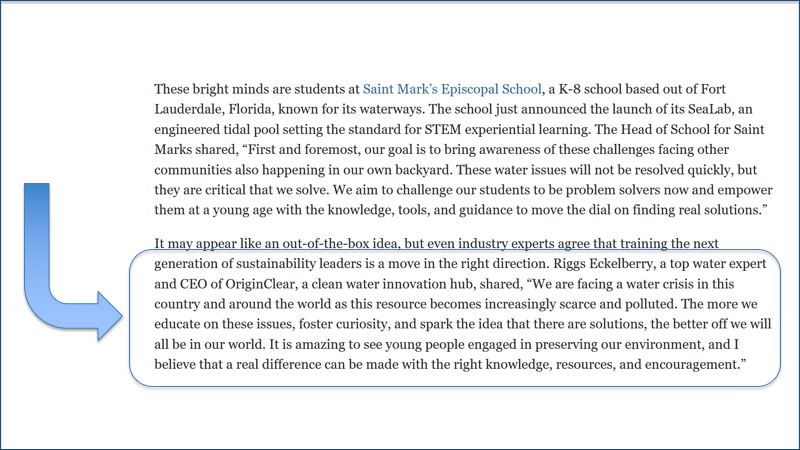
And I made a comment about that. And this is the kind of thing that sort of keeps us in the, in the game, so to speak. And we're going to be doing a lot more of this Waterworld, Water online type stuff. It's very important.
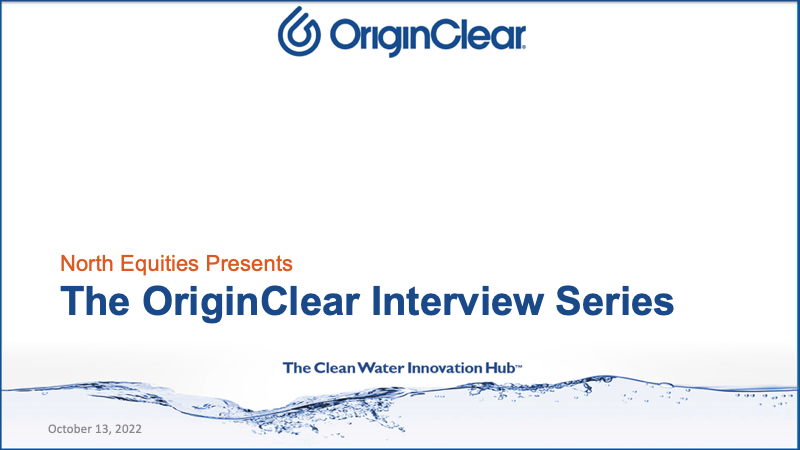
Now I'm going to go ahead and play a couple of interviews. As North Equities moved in to start spreading the word about us. So let's go ahead and play a short one with me and a short one with Ken. Here we go.
Start of video presentation
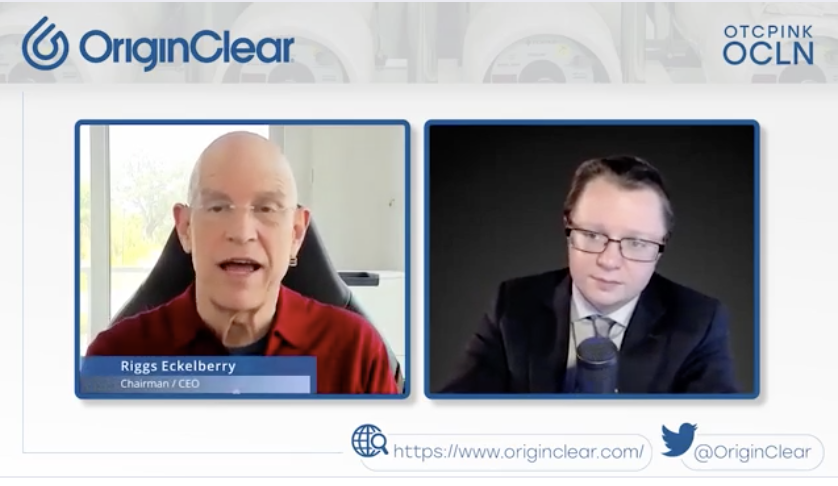
Michael: Thank you, everybody for joining us here at OriginClear's Channel. Just want to let you all know what we're going to be doing with this interview series here. We're going to be going through company updates and industry updates, answering any questions you guys have for us. If you have any, don't be shy and please send them over. And we will, of course, be introducing members of the team. So who better to kick us off for video number one than Chief Executive Officer, Chairman of the Board, Riggs Eckelberry. Riggs How are you doing today?
Riggs: Michael, I'm great, thank you very much. And since the hurricane passed us by, we're super happy.
Michael: Good. Glad to hear you're in the clear down there in Florida Riggs. And what I really want to do is get to know you a little bit and get the origin story of OriginClear, so to speak. So first and foremost, tell me about your past experience. What really makes you tick as a businessman?
Riggs: Well, it's a really good question because I had an early career in the nonprofit space. First of all, I was raised internationally, so I have no home. Kind of like bummed about in the Caribbean and Europe. And my dad was the Mad Men guy, you know, like very, very typical fifties type exec. I got bit by the nonprofit bug, and as part of that, I actually became a merchant mariner, sailed the seven seas, all that good stuff.
Finally, in the eighties, I got really fascinated by the potential for high tech to transform our society. And as you know, that was this is just when businesses were starting to move from the paper records to the computer records and so forth. And that's what I jumped into in New York in the eighties. And that was a learning experience. Try having 12 people, payroll every two weeks in Manhattan. That was fun and different.
But what I learned from that was that tech really is transformative. It makes big changes happen. And eventually I gave away that business to my best salesman and he's done a great job with it. I moved on to LA and ended up in the dotcom in the nineties, which was perfect for me. I loved the fact that you could use computers not just to calculate but to communicate. And of course we've seen that happen.
The world is is really communicating on the computer a big time. And I had learned so much during the dotcom and I think started going up the ladder, so to speak. And by 2005, I was the number two of a company that was going on to the Nasdaq. It successfully did, but I saw that there were cracks in that company that could not be fixed. And I also felt like all number two's that I could be a better number one.
So I spoke to a fund that I'd gotten to know, and they said, yeah, you could be a CEO, but we're not doing tech anymore. We're doing green. And specifically we think that algae is the next biofuel. And do you want to launch a company in the algae space? And I'm like, okay. In fact, I had a brother who had some some intellectual property in the area and we launched a company in the algae space.
And I had so much fun with that. I was on all the top mass media shows and so forth, and I was called Algae Man. It was a lot of fun. Unfortunately, fracking arrived, cost of crude oil dropped below $50 and all of a sudden algae was a science experiment. So I'm not accustomed to just giving up. So we pivoted, and our technology for extracting algae from water became a technology for extracting toxins, sewage, etc., from water.
And that became the company that was eventually called OriginClear and we then learned so much about the water industry because it's essentially unchangeable. It's very set in its ways. So basically, what what we learned: algae was like, who knew it was brand new, everything was, there was no existing world of algae. All of a sudden, water has been around for a couple of hundred years and it's very set in its ways, probably rightly so, because of public health.
But at the same time, we learned that it's very hard to change and there is change needed in water. We've seen it happen all the time. Jackson, Mississippi, the water ran brown. Why? Well, it turns out that water infrastructure has been neglected at least since 1960, and it's gotten worse and worse. So we have a problem where the central infrastructure is decaying in this country and in other countries there's none at all like look at India. It's basically no infrastructure.
So there's a real problem with central infrastructure and it won't be solved essentially, right? Definition of insanity is doing the same thing, expecting a different result. So the solution then is to unburden the central system with do it yourself water treatment by businesses and agriculture, who represent about 90% of all the demand.
Michael: You know what's really interesting, Riggs, and one of the reasons why I would like to dive deeper into this on the next video is, is water is, if not the most important thing, one of the top three most important things infrastructure wise for virtually any country to have any level of success in health health at all, right?
I mean, poor sanitation, poor access to water is one of the leading causes of death in almost any nation that doesn't have quality access to it. So, I'm real curious to hear your thoughts deeper on related to ours falling apart, because that's not something I would like to see happen either. But pulling the conversation back to you for just the last little question here, Riggs, What is it like being the chief executive officer? What do you handle now that you're in that role?
Riggs: Well, it's a really good question, because for a long time I didn't have a good bench. It takes a while to build your crew. And I've I've been around other execs and film directors, for example, who they took their crew with them because it's that's the value once you have your team, that's the real asset. And so it took me really until 2018 to literally ten years to finally get a team of top, top technologists, top managers, really great business development people, etc.. And that's when my life turned [from] just a hectic feed the fire feed the fire to, "We got something going on." And I can actually breathe and think and get strategic. And that's the story for the last four years, what we've been doing.
Michael: Interesting. I have definitely heard that before, that it's not it's obviously not just one person ruling the ship. It's a team of people. And I've also heard it described as instead of it being a pyramid shaped top down thing as the CEO, you're kind of the root of root of a bush trying to enable everyone to grow as best they can in their respective areas.
Riggs: It makes a lot of sense. Another way to look at it is sort of a 360 look where you're you're the hub and you're trying to reconcile the full 360 degree view of everything that's going on. And you can, that can become a trap or you can rise above it and have a great view of all the competing needs and bring people to bear on the problems. So it's not always you.
Michael: Well said. Well, Riggs, this has been a great introduction to you. Thank you for coming on. Is there any last pieces of information about yourself you would like to share with people today before we go?
Riggs: Well, of course, I because of my background, I am an idealist, but I really feel that just giving won't solve problems. You have to find the actual solution and usually it's technology. And with the technology comes the financial solution, which is why in the next interview we'll discuss the fintech we came up with, which I believe is a major solution to this problem of degrading infrastructure.
Michael: Perfect. Well, Riggs, thank you so much for your time today. Thank you, everybody, for watching. If you have any questions, don't be shy. And please send them over. Riggs Thank you. Look forward to chatting again next time.
Riggs: Can't wait, Michael. Thank you.
End of video presentation
Riggs: Excellent little interview and there's going to be a lot more of this. And obviously, you know, it's like the tree that falls in the forest and nobody sees it or hears it. Did it fall? So obviously it's all going to be about the distribution that this outfit gets for us. And we have high hopes. I'm now going to move on to the same interview of Ken. I haven't seen it. So Ken, I just hope you did a good job because, you know, we're rolling with it.
Start of video presentation
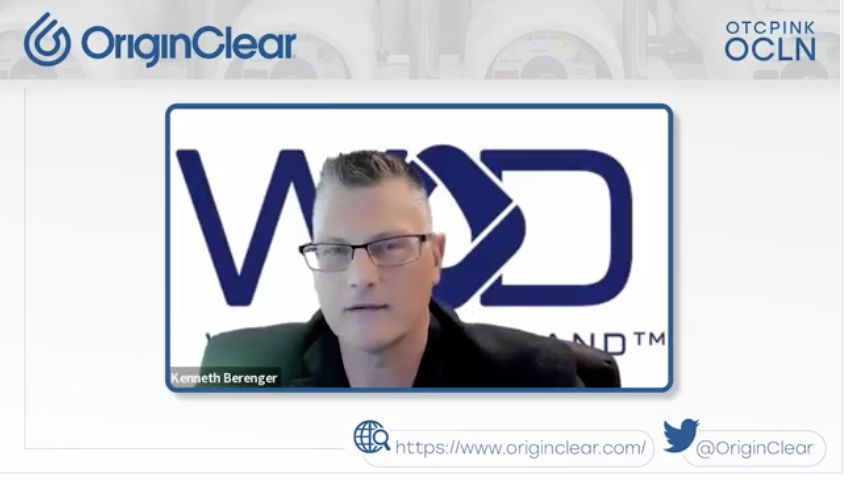
Michael: Thank you, everybody, for joining us here at OriginClear's Channel. We have another special interview for you guys today as we sit here with executive vice president and co creator of Water On Demand™, Ken Berenger. Ken, how are you doing today?
Ken: I'm well, Michael. Thanks for having me.
Michael: Perfect. Very glad to have you on. So, similar to how we did with Riggs, what I'm real curious about is your past experience prior to getting involved and your progress to where you are today. So before you got involved with OriginClear, Ken, tell me about what you were up to and like. What really makes you tick as a businessman and entrepreneur?
Ken: Okay, very good. Well, going back to the beginning, I was a retail broker back in the very early nineties, so I've got a 35 year career in various parts of being an entrepreneur, finance and so on, investment banking, real estate financing. What I did, I was a retail broker back in the very early nineties, prior to the prior to the TD Ameritrade, Charles Schwab era where retail became kind of a different animal. It kind of evolved into many of your folks became money managers, but I did that is a very young man.
Wall Street became a little tough to just I mean, just traveling there every day. I lived in I lived on Long Island. I lived in Manhattan for a while and after oh, I don't know, the early nineties, I became a little bit, working on Wall Street I became acutely aware of the opportunities that were out there in all kinds of other businesses. Right? Because you're constantly underwriting these companies and you're seeing about all these other opportunities.
So becoming a little bit, um frustrated with retail, I branched off and got involved in a lot of real estate financing. I ran several firms, marketing companies that were able to do outreach for mostly C to be customer to business type things. Legal firms ran a mortgage bank for a while. Real estate financing that ran up through to about a decade ago.
And I did a lot of elite sales training. I was, I was brought in by folks to basically train sales forces. I had done that pretty successfully with stockbrokers. I basically told them how to present themselves, how to, how to prepare, to come, to show up to work with all of your ideas clear. How to how to convey your ideas to the to your customer. And for good or for bad I was noticed by a gentleman who turned out becoming a friend called me.
I was training, I trained a bunch of folks that they had come in and about a year later he called me and said, I had a couple of businesses that were running, it was good, money was coming in, it was it was comfortable, I was living on Long Island. That wasn't so great. But I got a phone call and he said, "Look, I'm a president of a public company, small microcap company, and we think we're really, really close to being able to do something great, but we really need capital. I heard you speak, blah, blah, blah. Can you raise money for me?"
And, you know, up until that time, the jobs act and raising money for microcap companies and private placements was something I didn't even entertain. Well, I had, I had a pretty successful business that was running. It wasn't something that required all my time. So I said, "You know what? Sure, let's do it." And I kind of took my old set of skills from the early nineties, from 25 years ago now at that point and put them to work on developing a way to raise money for these private investment, public entity type companies.
I did that really well. It went well for about four years. My contract was up and I was kind of doing a month to month thing and a mutual friend who I worked with from way, way back when also knew that I was in the space and asked me, he said, "You know, I know a fella that, this incredible company, he's a genius, but he really needs, he needs that thing, you know, he needs someone that can help, um,project the message of what they're trying to do. I think they can be a great company. But he really needs they they need they need someone to raise capital for them."
Okay, great. I met I met Riggs at that point. We did we did a quick phone call and. You know, I think I had I was I was at the end of my contract and I said, you know what? Let's do this. And I think I started the very next month. That was four and a almost four and one half years ago since then.
So I came in as a contractor. I basically had a marketing firm. I had I had folks that worked the phones. Remember when people used to sell stuff over the phone, Not Zoom? Yeah. So, I had a whole room full. I had space and a dozen guys on the phone phoning prospective investors, calling up the usual, folks like me right? And was very successful at it. So I kind of took that whole operation and brought it over to OriginClear and was able to establish a real good solid marketing arm for the company in very old fashioned investor outreach.
I came in as a contractor and I worked that way for a while. But as this started to develop, Riggs and I would get on these calls at 11:00 at night and I would start giving, I'd have ideas on how we wanted to structure the offerings, on maybe how different creative ideas on how we wanted to work with the company said, "Look, I want you to come in. I want you to. I want to..." You know, this is the same philosophy I have. If he's an agency guy, his loyalties to the agency, if he works for you, then his loyalty is for you, right? So he had a similar philosophy, right? He felt I had a lot to offer. Hopefully he was right.
And I came in as a VP of business development. I was developing the OriginClear business with Riggs. He was kind of my co, my costrategist. That developed for quite a while. And in the meantime, we got the company really in good shape. Our financing was strong, the way we were raising money. We weren't going to these, these lenders that are very, very common in the market or in the microcap space.
We were working with your mainstream high net worth accredited investors who like the idea, who are going to take a little bit of their more aggressive capital and understood that in a couple of years it could be that, that moment. Right. And that's a good strong investor base because these folks, they understand what you're doing. They understand you're building something, they have foresight, and they also have a little bit of patience. They're not looking in six weeks going, how are we doing right? They're those those angel and not quite angel, but close to an angel type of investor.
So as we began to really accelerate these efforts, OriginClear began to make a couple of really good moves. Hopefully I had something to do with it. Certainly Riggs had everything to do with it. But we you know, we made a couple of very smart acquisitions. We brought in some talent. We began to build a team. So at first it was just Riggs, then it was just Riggs and I. So it was like two guys with our backs to each other, you know, trying to knock off all the bad guys, you know?
And after a while, we got really good at that, and we would have these late night calls and we'd be finishing each other's sentences. So it became kind of a mind meld and it really became a really good partnership between he and I. So we got to a point where we were great with capital. We had an amazing team, a great COO, a great CFO, we had Progressive Water Treatment, we had Modular Water Systems, and COVID came around.
And we kind of had that oh, crap moment, you know, what are we going to do? We thought the world was falling. We didn't know that at the time the government was going to hand out $6 trillion of money to anybody who could fill out an application. Right. But at the time, we really thought that it was going to be what we experienced in our own growth as a company. And finally getting these operating units to that have a huge demand for product out there.
But it was always getting stuck in the money, you know, eight, eight out of ten of your targets. I need $1,000,000 system. The only thing I'm missing, guys, is $1,000,000. Right. So these are these are your small to midsize companies that are the most cash strapped where access to capital is the very, very hardest. Yet they make up the overwhelming majority of the market and they're also the overwhelming majority of the opportunities in the market. The folks that can't say yes. Right.
So we developed Water On Demand and it started out basically with an idea of be the bank, provide the financing. So as I took on a larger role and a lot more creative input with putting the Water On Demand project together, I was brought through as executive vice president. So really it's essentially Riggs, myself on the executive side, not on the operations side. And it kind of just funnels down there.
But we're still, you know, Batman and Robin, we're kind of that team that does most of the creative thinking. I'm more of the creative and communication side and Riggs is magnificent at taking my communications and and organizing them and helping put them together in the corporate structure so they're able to resonate through to our admins and we're able to execute.
Michael: Well Ken, it sounds like you're bringing a lot of experience to the table. I'm glad you could kind of walk through your role for us a little bit. I guess the last thing I really want to know from you is really what is the the real kernel or the diamond in OriginClear and in, inside of Water On Demand that really keeps you so interested and passionate in moving forward.
Ken: It's the single it's the single largest potential wealth creating event of our lifetime. Its Water as an Oil Well™. It is literally the most valuable commodity on Earth, on earth that has never been monetized ever until now. And it enables not only guys like us, accredited investors, but literally the whole world can be a direct investor in actual water treatment systems and have a measurable impact on the quality of human health around the world and get paid to do it.
Water is the single commodity on the planet that is immune to demand destruction. We see what's happening in the market right now. We're about to go through what many say is, depends upon who you listen to, but the optimists say it's going to be nasty, but we'll be all right. And then the other side goes it's hell on earth. It's going to be hell, you know, guys like Ed Dowd, who I think is absolutely brilliant, says it's going to be hell on Earth for ten years.
But here's one thing for sure. As populations increase, as populations move out of the cities, the need for clean water distribution systems will be there. Water On Demand literally connects a end user to a manufacturer to an investor all through an Airbnb or Amazon like Marketplace. It allows for the world's first true private utility and the ability for ordinary people, as well as the more affluent to be direct ownership, like energy. People have preserved their wealth for four decades in the energy model.
This is water, It's an oil well for water. And I think that, I think at a time where even assets, real estate, energy, everything is upside down and topsy turvy, you don't know what where the heck do I put my money? One of the most powerful messages is the way we've structured this investment. It is so, look, you can't be first in energy. You know, energy works, right? You can't be first. You can't be first in real estate. You can't be first in gold. You can't be first in any of the things that you think may, may or may not protect your money.
Right now, you can be first in water. This has never been done before. And we've put together a structure that I believe 10% of your portfolio in Water On Demand can take your and turn your entire upside down current asset portfolio and right it, make it right. And we actually have a way of calculating that. So we can send people to a calculator. They can plug in their own numbers anonymously. I have $1,000,000 in the market. I'm down $300. $400 and $500,000, which they are.
A lot of people, by simply taking 10% of their assets and putting it into a securitized, revenue generating, royalty generating asset with even stock grants attached to it, so there's liquidity events as well. They can take 10% of their of their portfolio and actually rescue their entire overall, they're essentially dollar cost averaging, their entire asset portfolio lower.
Michael: Wow.
Ken: And that's exciting.
Michael: All right, Ken. Well, I'd love to dive into this further across these multiple interviews we're going to be knocking out here. But so far, I think you've did a great job really introducing yourself, talking about your role and talking about the passion of why you are here. So thank you so much for coming on. And thank you, everybody, for watching. If you guys have any questions for Ken, I am sure he would happily hear you out and answer them. So don't be afraid to send them over. And Ken, any closing words from you before we go?
Ken: Yeah, if you, if you want to find out more, if you want to use the calculator, if you just want to ask me questions, you can go to oc.gold/ken, oc.gold/ken and get on my calendar.
Michael: Wonderful. Thank you so much for your time again today, Ken. It was a wonderful meeting and look forward to having you back.
Ken: Pleasure meeting you, Mike. Thanks for having me.
End of video presentation
Audience Questions and Answers
Riggs: You don't often get a debrief from the self effacing Ken Berenger. And I think we learned a lot more about him and what he's about. So that is really wonderful to hear. Let's see what's going on here and the chat lines. Keith Roeten says, "Ken is a great communicator." I couldn't agree more. All right. And then let's see what we got here.
Bobby Roe, "Please explain the technology behind OC." Our technology is very simple. We have a set of five patents that we have licensed for a very long time, worldwide, around Modular Water Systems™. How to deliver water systems in excuse me, in a box, as we call it. So Modular Water Systems is our prime technology. It is taking off. In fact, we'll be talking about the fast growing pump station business, which is a very specific business that we are starting to really make some traction in. So that's our primary technology.
Now what goes into those? We have some technology with it, but we also are willing to let anybody else put somebody else's technology in that box. So it's really a delivery method. And Dan Early, the chief engineer visionary who came up with these patents also has an amazing software product line that configures these things automatically so it can spit out water systems like an assembly line. And that is so unique compared to the way the water industry works today. All right. So hopefully Bobby answered that. And I see that Kevin did a great job of talking about that, too. So thank you, Kevin.
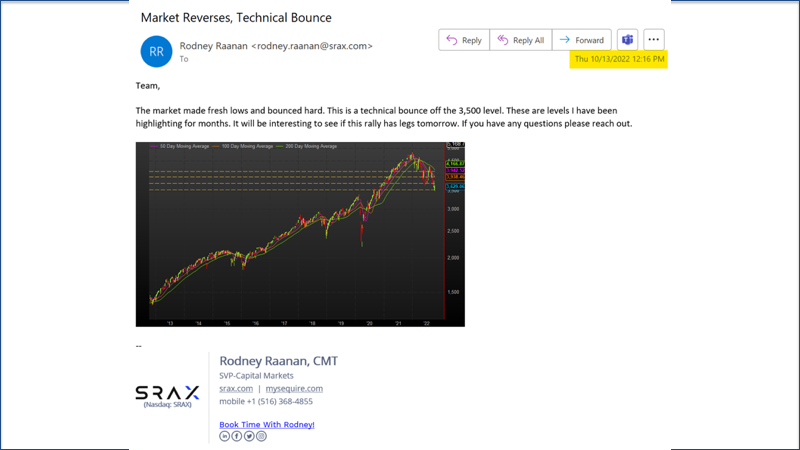
Crash! Recovery!
All right. What's going on with the economic news? Crash! Recovery! It's crazy this morning at 8:57 a.m. from our partner at SRAX, which is they help us market to our shareholder base. Futures tumble, 100 basis point rate hike is on the table. We're bearish, blah blah, blah. So then, 12:16 p.m. market made fresh lows and bounced hard technical bounce off the 3500 level. This is the S&P 500. So he was all of a sudden he changed his tune. Personally, I think it's kind of a dead cat bounce, but like I said, we'll see.
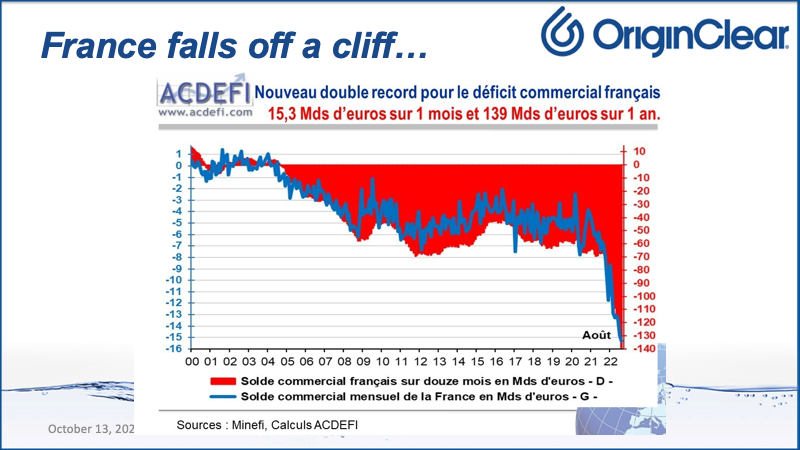
Spiraling Deficit
Let's take a look at some of the fundamentals behind all this. Look at France. This is a graph. The blue is the monthly deficit in billions of euros. And the red is the 12 month deficit in billions of euros. And it's basically falling off a cliff that's like, oh, my God. 15.3 billion on one month and 139 billion on one year. That is the new deficit and they are not stopping. So there's a lot of issues with debt.
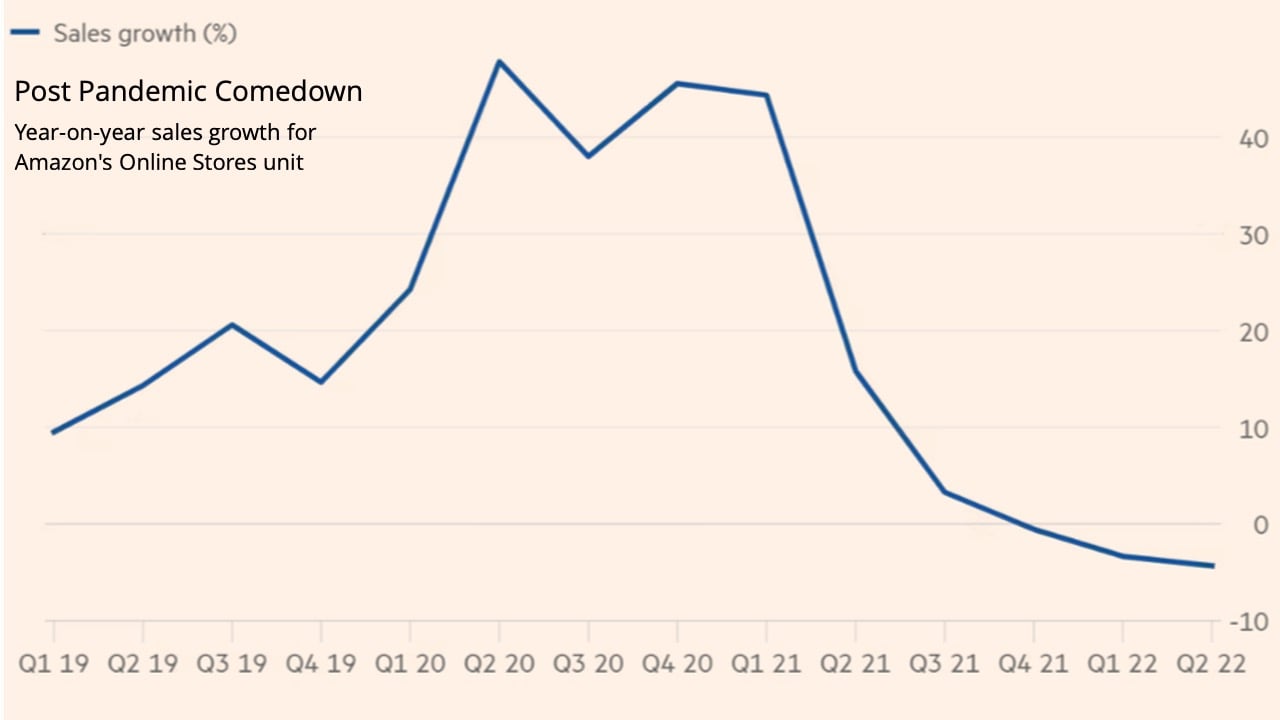
Demand Destruction
Now there's another more important issue perhaps, which is that we're watching Amazon actually its year on year sales growth is dropping, which is why they had a second prime day this year. Hmm. Interesting. They're trying to backfill. Of course, there was a big growth. They were booming going into Q1 of 2020. Even before the pandemic. They were on they were on a real tear. They maintained it throughout 2020.
But then in 2021 onward, it kind of went off. I don't think that has anything to do with Amazon being incompetent. I think it has a lot to do with demand destruction. There's much less demand. People are spending less and where they're spending money is on things they can't control, like their mortgage went up or whatever. Gasoline more expensive, that kind of stuff. So this is a really interesting graph and it really says that we are in an a demand pullback for the economy. Conclusion we're not done.
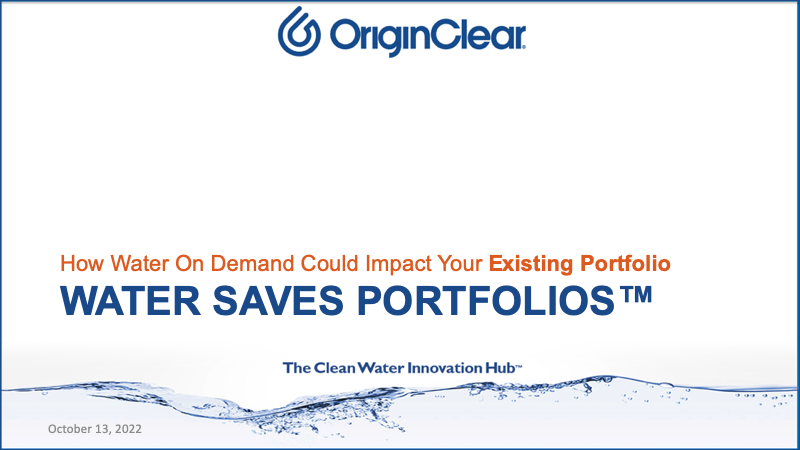
Okay. So you heard Ken talk about how water can save your portfolio. And so I've recorded today something which we're going to be using that kind of tells that story. Here we go.
Start of video presentation
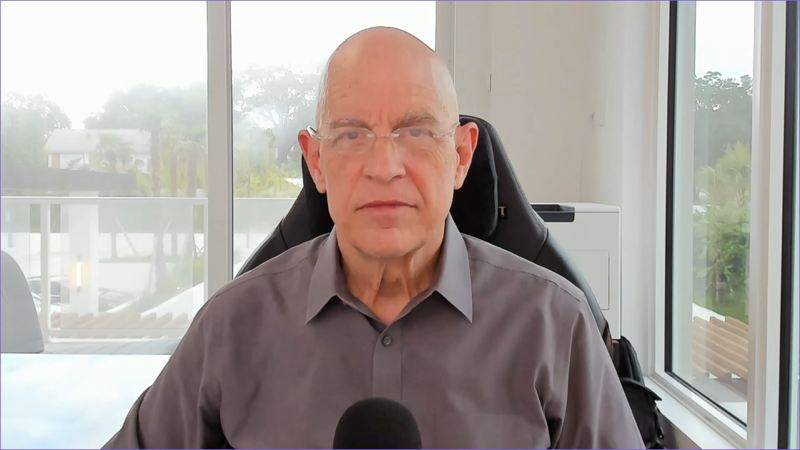
Hi, I'm Riggs Eckelberry. And if you're like me, you are dealing with a portfolio problem. The markets are not happy. They're getting worse. And going to cash is okay, except that cash itself is losing its value by the day. So what do you do? Right. I guess. Tough it out. Yeah, that'll work out over time. But meanwhile, the spouse isn't very happy. Right. So, what do you do?
Well, one of the ways to deal with this is to invest in something that is just new, a strong, vital asset that is just beginning to make its run, an asset that has been coming out of a government monopoly and is now being done more and more by businesses and this is called decentralized water where businesses do their own water treatment, right?
And a lot of people are doing this. Some pretty big players like JPMorgan Capital, and they're doing very well, believe me. So, how can you participate? Well, my company is the only one that enables everyday investors like you and me to actually participate in the profits, the annuities from these water projects. And they're set up basically on a pay per gallon basis, just so the business is basically paying the way they're accustomed to paying the city, but they're paying our program, which is called Water on Demand. And you as an investor participate.
Now, it's great because first of all, there's some royalties. There's a measure of protection by the fact you can enforce the royalties with the water assets, that's built right in. There's also some amazing benefits in terms of stock, early stock that is potentially valuable. All these good things are stuff that you should discuss with my co founder, Ken Berenger, and he will tell you exactly how it can work and he will show you how your portfolio is here. Water On Demand is here and all of a sudden things are potentially very good.
So this is worth doing. I really feel that you have the potential to rightsize your portfolio. I kind of think of it as Apple 1984, right? It's like so early and so powerful that it can deliver some amazing upside for you and your family. So with that, I recommend you contact Ken. All you got to do to schedule with him is in your browser put oc.gold/ken, oc.gold/Ken, schedule with him. I think that it's going to be very, very good. And I wish you the very best in this economy. We all deserve to do well. Thank you.
End of video presentation
Freewheeling Discussion
And that is that. And I'm going to invite a Mr. Ken Berenger onto the screen to talk things over. Can you hear me?
Ken: Aloha.
Riggs: Well, I like this direction. You know why? Because I myself am frustrated about my portfolio. I'm like, Ameritrade. I went to cash.
Hidden Inflation
Ken: I stopped looking. Just just you know, when they say if you want to get out of a hole, stop digging, you know. I And here's the thing like. We're fairly sophisticated people. We should we should be able to do this. None of the old rules have applied. So I heard someone describe it today in a very, so when financial people get on CNBC or MSNBC or Fox News Fox Business, they tend to get these analysts who are extremely analists, right? And they use that, they use language that people's eyes roll up in the head.
But essentially what this fellow said was, look. We stomped on the gas two years ago to COVID and accelerated a process that had, inflation was rampant since ten 2010. Where was inflation? And like silence. He goes, It was in the stock market, all the bailouts in oh eight, and it flooded the zone to the banks and companies. And what did they do? They bought they bought stock. Every, so basically, the wealthiest people in the country doubled the price of the stock market in a couple of years timeframe. So that's why your chicken cutlets hadn't tripled, right?
Now, the raise of interest rates have have continued to partially fuel that. People are running to the market, but now with the rise of interest rates are going well, I can go into I can go into instruments. But another interesting thing is we had the ability in the eighties, we had a terrible thing, inflation in the eighties, but in the eighties we built things and we had tradesmen, we had industries, we had energy.
Where to Invest
The petrol, the dollar being linked to oil. Everyone is saying, "Look how strong the dollar is." The dollar is failing up. The rest of the world, if they want to buy oil, they have to buy it in US dollars. Therefore they have to buy our dollars. So they're kind of, it's that artificial price increase in the US dollar.
And as energy prices get higher, we print more money to supply them with more dollars to buy instead of just them allowing them to suck the money we've printed up, they just keep printing it more. And today's announcement, of course, the COLA, the cost of living adjustment for Social Security was almost 9%. So we're already, we already have a system that's bankrupt. We already have a country that's printing money, and now we're going to print 10% more right out of the gate. So this is...
Riggs: Debt service is doubled, right? The interest has gone up.
Ken: At least doubled, right? The place I'm buying in Clearwater, the mortgage payment I'm going to be paying now is double what I would have been paying. Of course, I would've paid a lot more.
Riggs: Exactly, well the principal, the principal of the house.
Ken: I comfort myself with that.
Riggs: It's like bonds. You know, when bonds, interest rate on bonds go up, the value, the bond goes down. Right. So your yield is what it's all about.
Ken: And someone said to me, "Well, why don't you wait for the bottom?" I said,"I don't know where the bottom is." I know that my cash is losing 20% a year. I don't think I don't think the properties I'm buying are going to lose 20% next year if they do I'm even.
Riggs: Well, not only that, rents aren't going to go down because people have got to live somewhere.
Ken: Rents will go up. Rents will go up. Exactly. Because because it's renters market. So there's there's going to be some bright spots. But everybody who's in all of these traditional assets are they know it's just basically, it's like you're on the bull and you know how like they tie their hand, they wrap their hand to the horn, you know, because it's going to, they're just got to they just got to hang on.
Riggs: Well, but the point I was making my video was you can let that be.
Ken: Yes.
Riggs: Wait for it, HODL. Hang on for dear life. Let it be. And because the Water On Demand investment is so privileged. The people who get it, people talk to you, they go. "Thank you, Ken, for the opportunity," when they get it.
Ken: Yeah.
Riggs: Lord.
Offsetting Portfolio Losses
Ken: Yes. Well, no. And you see the light go on. Look, there's a lot of layers. It's a fairly, it's a fairly complex set of ideas. I think what we try to do every day is working on simplifying it. Yes, but once the light goes on, here's how I can very simply put it: you have the ability to be in an asset that has yet to be monetized and you have all the benefits of being an Apple investor of 1984, attached to the same asset which hasn't been monetized. What part don't you like?
Riggs: And it offsets your.
Ken: Very, very unfair question. I know.
Riggs: And you'll be able to brag to your spouse. Like yeah, you know what? My amazing job.
Ken: I was there, right? I was there. You were one of them? Yeah, I was one of them. Yeah. So it's, it's a and I do think and look, I get the whole spouse thing, you know. I'm not worried about Amazon, by the way.
Riggs: I don't think Amazon is going anywhere.
Ken: My wife. Yeah, my wife's going to keep them going.
Riggs: I keep thinking about the people that made money from cardboard. Lord.
Ken: The cardboard manufacturers are killing it. So, but the, getting back, joking aside. Amazon is a, what did I say to you earlier on the phone? If clicking a button and getting stuff delivered to your house slows down. Right. It's not the price of gas that's preventing you from going to the mall or the supermarket. Right. This is literally people going, okay, I'm pulling my horns in. It's the bare necessities, right? You know, steaks, $18 a pound. Right. So, you know, I told you what I did. Right.
Water Business Booming
Riggs: But then let's look at our core business, the water industry, for example. Right now we have a national account. They are expanding. They provide interstate services. I can't say more than that. And they're expanding fast. Why? Because people are driving more. They're driving instead of flying because flying has turned into a total disaster. And as a result, they're opening up all of these interstate activities, shall we say.
And they have to have pump stations. They have to have pump stations because of the gravity issue. We are printing money. And I just want to say that we are planning our next announcement will be about the pump station business. Now it's gone from being just 10% of our business in the first half of the year to I think 60% of our current quotations in October. So it is really on a roll out.
Ken: Wow.
Riggs: It's a very exciting situation. And what's great is that like pancakes, like, you know what it is? It's a shaft pump at the bottom, controls at the top. Roll it out.
Ken: It's like, it's a it's a fan with water, you know. So here's another thing that's important for the prospective investor to recognize. Whatever the dollar is doing, water is doing it four times faster. The recipient of those royalties will weather that storm.
Riggs: Yes.
Ken: So, okay, if the Water On Demand listing event takes a year or two, a couple of years, that's fine, right? You know, and as we build this portfolio of valuable properties, if that begins to elevate the core part of the OriginClear portion of this thing, well, then while you're waiting to get these revenues, you can have some liquidity events. I don't think that that's really out there.
Free from Maybe's
You've kind of got to you kind of pick a poison. You want to take a chance on equities. Right. You could be right. It could be wrong. And they're already so wrong. I think I think the appetite for risk when a guy looks at his portfolio down 35 or 40% is completely different. So providing an equity event that doesn't take on that, maybe you're right, maybe your wrong thing, I think is one of the most attractive features.
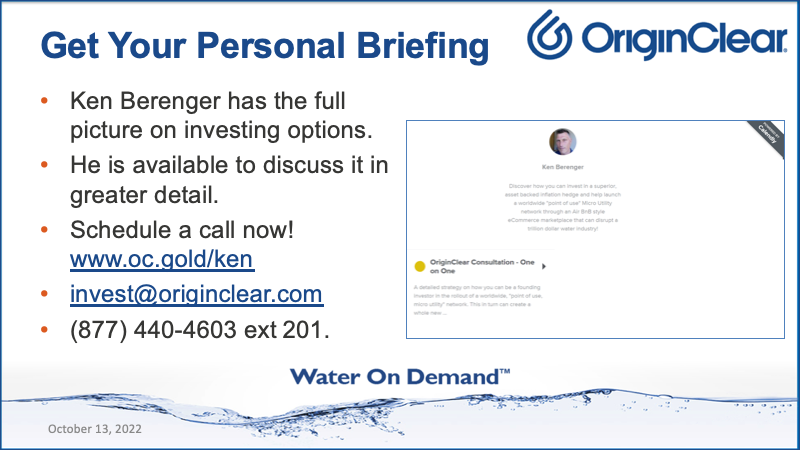
Call Ken
Riggs: You don't want to roll the dice. You don't want to. This is the most common sense offering we've ever made. I think it's brilliant and I love the fact that you're out there creating every single day. People who want to talk to Ken and get the real dope should just put oc.gold/ken to schedule their call or email invest@originclear.com. I think, I think you've got to you've got a few slots available still, maybe?
Ken: I do, I do and I can always make one.
Riggs: Good.
Ken: I'm excited. Things are, things are really humming. I'm happy with where we are. I'm sad that people are suffering. Everyone's hurting. But I'm even more proud that the power of what we put together can help make it right. The way this thing is set up is set up to kind of what was the word I would we were discussing, I think, offset. To offload a lot of the risk to offset a lot of the current downside.
Riggs: Portfolio transformation.
Ken: It has that it has that potential. Sure.
Riggs: And by the way, you were talking about it's going to take a while to ramp up these water systems. But in fact, we are not letting that money sit idle. It's being worked and investors are going to be extremely happy with the royalty checks they get because we are we have chosen to pass on the benefits of working that money directly to the investors. So it's going to be good.
Ken: I do get asked about that. So hopefully we'll be able to, we'll be able to provide a little bit more detail on that shortly.
Riggs: Well, no, there will definitely be some payouts happening within the next 30 days. And that's going to be very exciting.
Ken: Beautiful. Okay.
Next Week
Riggs: Okay, everyone. Well, listen, it's been great. Thank you very much for being here. It's been a good show and it didn't go over long, which is good. And next week we will have that big announcement about pump stations, more educational about how it's going and so forth, and showing how the stats are going.
It is really a strong business that we, it's our next spin off. All will be in the press release and we'll be discussing it further. I will interview Tom Marchesello on how it's going in our business.It's gonna be very, very interesting. So do join us next week. We are continuing to be in there in the business of making water happen as the new gold.
Ken: Have a great evening, folks. Thank you.
Riggs: Enjoy the weekend, everyone.
Register for the next Insider Briefing: HERE
%20250px.png?width=250&height=53&name=OriginClear%20Logo%202019%20(RGB)%20250px.png)




